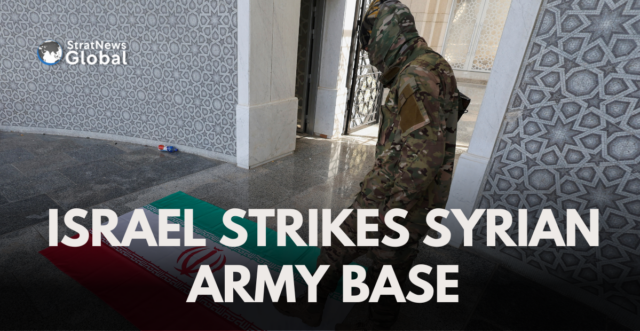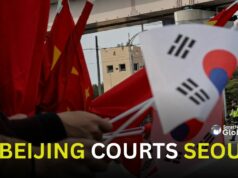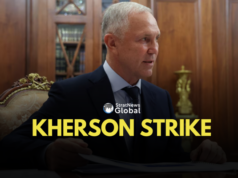Israel pounded Syrian army bases on Tuesday in strikes it says aim to keep weapons from falling into hostile hands, but denied its forces had advanced into Syria beyond a buffer zone at the border.
In the Syrian capital, banks reopened for the first time since the overthrow of President Bashar al-Assad, in a major step towards restoring normal life. Shops were reopening, traffic returned to the roads, construction workers were back fixing a roundabout in the city centre and street cleaners were out sweeping the streets.
End Of Assad Rule
In a sign foreign countries are ready to work with the former al Qaeda affiliate that led the anti-Assad revolt, the U.N. envoy to Syria played down the group’s designation as a terrorist organisation and welcomed its inclusion in a transitional administration.
Since Assad’s flight on Sunday ended more than five decades of his family’s rule, Israeli troops moved into a demilitarised zone inside Syria established following a 1973 war. Israel calls the incursion a temporary measure to ensure border security.
Three security sources said on Tuesday the troops had advanced beyond the demilitarised zone. One Syrian source said Israel’s troops reached the town of Qatana, several km (miles) to the east of the buffer zone where it held strikes and just a short drive from Damascus airport.
But an Israeli military spokesperson said troops had not left the demilitarised zone.
“The reports circulating in the media about the alleged advancement of Israeli tanks towards Damascus are false. IDF troops are stationed within the buffer zone, as stated in the past,” an official from the Israeli Defence Forces said.
Protecting Weapons
Israel says it is not seeking conflict with the new authorities in Syria, but its jets have been bombing targets and conducting strikes across the country over the past three days to ensure Syrian military equipment does not fall into hostile hands.
Regional security sources and officers within the now fallen Syrian army described Tuesday morning’s air strikes by Israel as the heaviest yet, hitting military installations and airbases across Syria, destroying dozens of helicopters and jets, as well as Republican Guard assets in and around Damascus.
The rough tally of 200 raids overnight had left nothing of the Syrian army’s assets, said the sources.
Turkey, Egypt, Qatar and Saudi Arabia have condemned the Israeli incursion. Saudi Arabia said the move would “ruin Syria’s chances of restoring security”.
Israel said its airstrikes would carry on for days but told the U.N. Security Council that it was not intervening in Syria’s conflict. It said it had taken “limited and temporary measures” solely to protect its security.
With the mood in Damascus still celebratory, Assad’s prime minister, Mohammed Jalali, has agreed to hand power to the Salvation Government, an administration previously based in a pocket of rebel-held territory in northwest Syria.
Hollowed Out
Rebuilding Syria will be a colossal task following 13 years of civil war that killed hundreds of thousands of people. Cities have been bombed to ruin, swathes of countryside are depopulated, the rump economy has been hollowed out by international sanctions and millions of refugees still live in camps after one of the biggest displacements of modern times.
The main rebel commander Ahmed al-Sharaa, better known as Abu Mohammed al-Golani, met with Jalali and Vice President Faisal Mekdad on Monday to discuss the transitional government. Jalali said the handover could take days to carry out.
Golani’s group Hayat Tahrir al-Shams (HTS) was once the Syrian affiliate of al Qaeda and has been designated as a terrorist organisation by countries and organisations including the United Nations, United States, EU, and Turkey.
But in recent years HTS has emphasised its break with al Qaeda and Islamic State, and sought to reassure foreign countries and members of Syrian minority sects it will not carry out attacks abroad or impose draconian religious rule at home.
Good Message To Syrians
The U.N. envoy for Syria, Geir Pedersen, told a briefing in Geneva that a transitional government for Syria needed to be as inclusive as possible, and should welcome HTS despite its past.
“It is now nine years since that resolution was adopted,” he said of the U.N. designation of HTS as terrorists. “The reality is so far that HTS and also the other armed groups have been sending good messages to the Syrian people … of unity, of inclusiveness.”
The reopening of banks on Tuesday was a major step towards restoring normal life, after Syrians were caught without cash following the weekend collapse of the regime.
Four mini-buses arrived at the Central Bank of Syria, with employees disembarking and walking into the building for their first day of work since Assad’s fall.
“It’s a new shift, it’s a new day, a new year, a new life,” said Sumayra al-Mukli.
(with inputs from Reuters)





